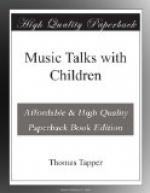And the master replied:
“There is a task, the greatest and severest of all. But a child must learn it. Thou must know from the first days, that all thou doest and sayest, whither thou goest, what thou seekest; these, all these, come from within. All that is seen of thee is of thy inner life. All thy doings, thy goings and comings, thy ways and thy desires, these are from within. And when all these things are for thyself there is misery.
“Now there are many things which may not be had by directly seeking them; of these the greatest are two. The one is that which already has given thee sadness in the heart,—the Light of the Face. And the other is happiness.
“But there is a way in which these are to be found. Dost thou not know that often, even with much trouble, thou canst not please thyself? But always, with little trouble or none, thou canst please another.
“And the way is Service.
“Thou poor little one! Thou hast come with thy complaint of unhappiness; and yet thou hast all that is bright and rare; companions, and music, and a dear home. Dost thou know that there are in the world uncounted poor ones, children like thyself, who have not their daily bread? And yet there are many of them who never fail to say: ‘Lead us not into temptation.’ And they say this without having tasted of the daily bread for which they have been taught to pray.
“And thou? Thou art unhappy. And thy daily bread is set before thee with music and with sunshine.
“Yet there are little ones, like thyself, who are hungry in the darkness.
“And thou? Thou art unhappy.”
CHAPTER XII.
THE GREATER MASTERS.
“In spite of all, I have never interrupted
the study of music.”
—Palestrina.
An opera writer of Italy, named Giovanni Pacini, once said that to study the writings of Mozart, Haydn, and Beethoven “lightens the mind of a student, since the classics are a continuous development of the most beautiful and simple melodies,” and we sometimes hear it said that great men are they who dare to be simple. In our Talks thus far we have learned one important fact, which is, that music is truth expressed out of the heart. Of course we know that to be in the heart it must be felt, and to be expressed we must know a great deal about writing. Now we are able to imagine quite well what a great master is in music. As Pacini says, his melodies will be simple and beautiful, and as we ourselves know, his simple melodies will be an expression of truth out of the heart.
But to go only as far as this would not be enough. Many can write simply and well, and truthfully, yet not as a master. There must be something else. When we have found out what that something else is we shall understand the masters better and honor them more.




